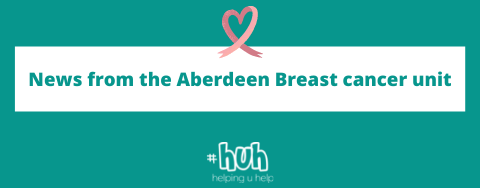Over the past year research activity in the Breast Unit has increased despite the impact of COVID. The team recruited 52 volunteers to breast cancer studies since January 2020, which exceeds the number of patients recruited during 2019.
In 2020 two of the ARI breast surgeons, Miss Beatrix Elsberger and Mr Yazan Masannat, were awarded NRS fellowships to allow dedicated time for research activities. This has led to a significant increase of the number of trials being offered to breast cancer patients in the department. Trials that the Breast Unit team have opened or will be opening soon are:
ANTHEM is exploring patient views for mammoplasty (removal of breast cancer and remodelling of the breast) as an alternative to mastectomy (complete removal of breast) for breast cancer.
ATNEC will investigate whether treatment of the lymph nodes in the armpit after chemotherapy and surgery (currently standard treatment) is necessary or if chemotherapy and surgery alone is as good for certain patients.
BEET will look to see if eating beetroot and leafy green vegetables, which are high in nitrate, can affect tumour progression
BRISK will look to establish if there is a difference in fat composition between people carrying a genetic mutation (BRCA 1/2 or TP53) with and without breast cancer
OPTIMA is looking at breast cancer tissue samples to see if it can be predicted if a patient responds to chemotherapy
PIONEER is looking at the effect of giving different combinations of hormones (Letrozole with or without Megestrol Acetate) in post-menopausal patients with early breast cancer.
POETIC-A is investigating the benefit of adding a medication called abemaciclib after surgery to high risk breast cancer patients identified after preoperative endocrine (hormone) therapy
SMALL is comparing standard surgery for small breast screening detected breast cancers with the minimally invasive technique of vacuum assisted excision.
Miss Elsberger explained: “Alongside these new studies we continue with our long running trials like ‘Characterisation of breast tumours by Fast Field Cycling’, a local study using a new imaging technique called Fast Field Cycling MRI technology to characterise breast tumours. The EMBRACE trial, also another local study, in a close collaboration with cardiology uses MRI imaging to monitor the effects of chemotherapy on the heart muscle. I am most delighted to say that our breast unit is the highest recruiter in the UK wide trial called PRIMETIME. This trial is investigating avoidance of breast radiotherapy after surgery in older breast cancer patients. The POSNOC trial, soon coming to the end of recruitment, is looking at adjuvant therapy alone or with additional armpit (axillary) therapy if cancer cells are found in the lymph node after surgery. Both of these trials are looked after locally by my Clinical Oncology colleague Dr Ravi Sharma .”
Dr Kirsty Shearer, NRS Cancer Research Network - North & East Manager, added: “All these trials are very much a collaboration across different hospital departments with input from doctors, surgeons, pathology, radiology, clinical trials pharmacy, the research data team, the research nurses and healthcare support workers. A very successful quarterly clinical trials meeting for the breast research has been set up and has been supported by all the collaborating departments and beyond.
